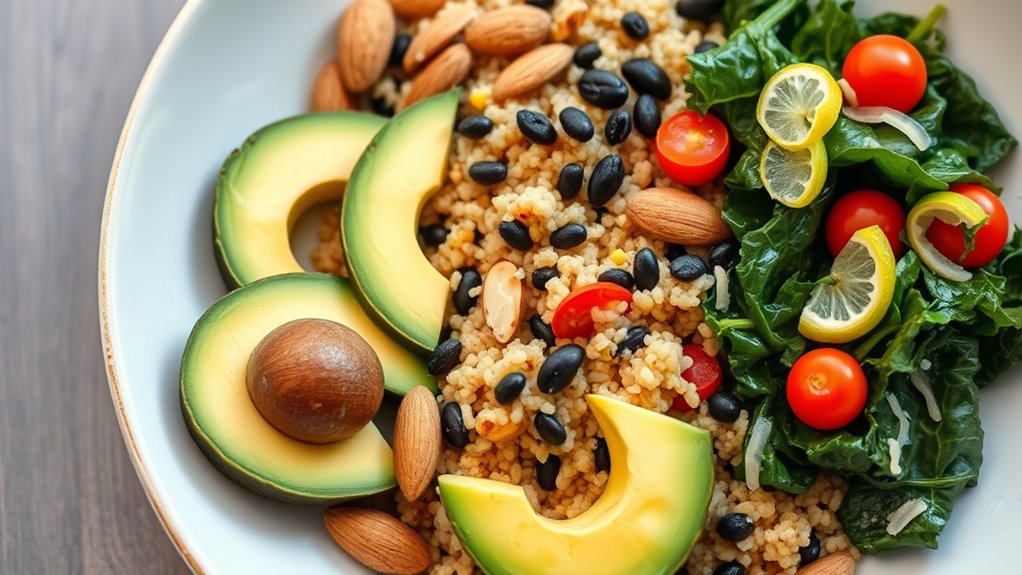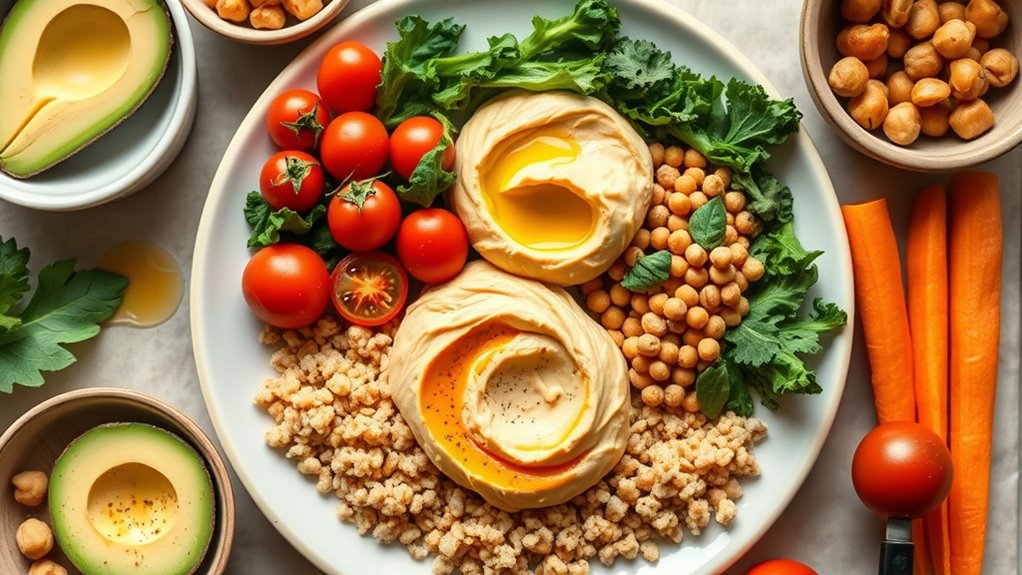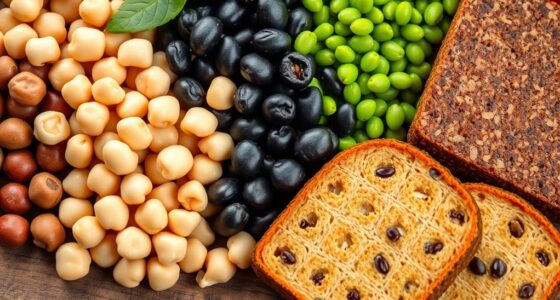To balance macronutrients on a plant-based diet, focus on including a variety of whole foods like grains, legumes, nuts, seeds, fruits, and vegetables. Pay attention to portion sizes to guarantee you get enough carbs, proteins, and healthy fats throughout the day. Pair foods thoughtfully, such as beans with rice, for complete proteins, and incorporate nutrient timing for energy and recovery. Keep exploring to discover more ways to optimize your plant-based nutrition.
Key Takeaways
- Incorporate a variety of plant-based proteins, grains, nuts, and seeds to ensure balanced macronutrient intake.
- Pair complementary foods, like beans with rice, to achieve complete protein profiles.
- Distribute carbohydrates, proteins, and fats evenly across meals to maintain energy and satiety.
- Use meal planning tools to visualize and adjust macro ratios based on individual health or fitness goals.
- Include healthy fats from sources like avocados, flaxseeds, and olive oil to support nutrient absorption and overall health.

Adopting a plant-based diet doesn’t mean you have to compromise on essential nutrients; in fact, understanding how macronutrients—carbohydrates, proteins, and fats—fit into your meals can help you maintain balanced nutrition. To do this effectively, you need to focus on smart meal planning that guarantees each meal provides the right mix of these nutrients. When you plan your meals, consider incorporating a variety of whole foods like legumes, grains, nuts, seeds, fruits, and vegetables. This variety guarantees you’re covering your bases for energy, muscle repair, and overall health.
Meal planning isn’t just about what you eat but also when you eat. Nutrient timing plays a vital role in optimizing your energy levels, recovery, and satiety. For example, consuming complex carbohydrates like oats or sweet potatoes before a workout provides sustained energy, while having a protein-rich snack afterward supports muscle repair. Spacing your meals evenly throughout the day helps maintain stable blood sugar levels, preventing energy dips and overeating. Additionally, including healthy fats in each meal — like avocado, olive oil, or flaxseeds — not only enhances flavor but also aids in nutrient absorption and hormone production.
Timing meals with complex carbs and healthy fats boosts energy, recovery, and satiety.
Balancing macronutrients on a plant-based diet requires a conscious effort to combine foods that complement each other. For instance, pairing beans with rice creates a complete protein source, ensuring you’re getting all essential amino acids. Similarly, adding nuts or seeds to salads boosts healthy fat intake while providing a satisfying crunch. It’s important to keep track of your intake, especially if you’re aiming to meet specific fitness or health goals. Using meal planning tools or apps can help you visualize your daily macronutrient distribution, making it easier to adjust portions or food choices as needed.
Another key aspect is understanding that different plant foods offer varying amounts of macronutrients. Whole grains like quinoa, barley, and oats tend to be higher in complex carbs, while tofu, tempeh, and lentils are excellent protein sources. Fats come from nuts, seeds, and oils, so including a range of these in your meals ensures you’re not missing out on essential fatty acids. For example, incorporating fortified foods or considering supplementing with fortified products can help address potential micronutrient gaps. By paying attention to nutrient timing and thoughtful meal planning, you’ll be able to distribute your macronutrients effectively, supporting your energy needs, muscle maintenance, and overall well-being on a plant-based diet.
Frequently Asked Questions
How Can I Ensure Adequate Vitamin B12 Intake?
To guarantee adequate vitamin B12 intake, you should include fortified foods like plant-based milks and cereals in your diet. Additionally, consider taking B12 supplements, which are a reliable and convenient option. Regularly check your levels with your healthcare provider to avoid deficiencies. Combining fortified foods with supplements helps you meet your B12 needs effectively, supporting your overall health on a plant-based diet.
Are There Plant-Based Sources of Complete Proteins?
Yes, plant-based sources of complete proteins exist when you combine different vegetarian protein sources. For example, you can pair beans with rice or hummus with whole-grain bread to create complete proteins. These plant protein combinations guarantee you get all essential amino acids. Incorporate a variety of vegetarian protein sources like quinoa, soy, chia seeds, and lentils into your diet to meet your protein needs effectively.
What Are the Best Plant-Based Fats for Energy?
Think of plant-based fats as your energy reservoir, fueling your day like a steady stream. Opt for healthy fat sources like avocados, nuts, seeds, and especially plant-based omega 3s from flaxseeds, chia seeds, and walnuts. These fats provide sustained energy, support brain health, and keep you feeling full longer. Incorporate them into your meals to create a balanced, vibrant diet that keeps your energy flowing smoothly all day.
How Do I Prevent Nutrient Deficiencies on a Plant-Based Diet?
To prevent nutrient deficiencies on a plant-based diet, focus on proper meal timing and include nutrient-rich foods like leafy greens, beans, and seeds. You can also consider supplement options such as B12, iron, and omega-3s to fill gaps. Stay consistent with your meals and diversify your choices to guarantee you’re getting all essential nutrients, making it easier to maintain your health and energy levels.
Can I Meet All My Calorie Needs With Plant Foods?
Think of your plate as a vibrant garden, where variety blooms. You can meet all your calorie needs with plant foods by practicing smart meal planning and incorporating diverse options like grains, nuts, seeds, fruits, and vegetables. This approach guarantees you’re providing your body with enough energy and nutrients. Keep your food variety rich and balanced to stay energized, healthy, and satisfied on your plant-based journey.
Conclusion
Remember, you are what you eat, so balancing your macronutrients is key to thriving on a plant-based diet. Focus on including a variety of proteins, healthy fats, and complex carbs to fuel your body and keep you energized. Don’t forget, Rome wasn’t built in a day—so be patient as you find the perfect balance. Stay consistent, stay curious, and enjoy the journey to better health!
Ilana has been a vegan for over 10 years. She originally made the switch for health reasons, but soon found herself becoming more and more passionate about the ethical and environmental implications of a vegan lifestyle. Ilana is the author of The Graceful Kitchen, a blog all about veganism. She loves to cook up delicious and nutritious vegan meals, and share her recipes with others who are interested in leading a cruelty-free life. Ilana is also a strong advocate for using whole foods as the foundation of a healthy diet, and believes that going vegan is one of the best ways to achieve this.










